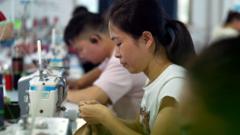The noise of unwavering sewing machines fills the air in Guangzhou’s Panyu neighborhood, a bustling hub for the fast fashion giant Shein. Here, in this area dubbed "Shein village," thousands of factories produce an enormous variety of clothing destined for over 150 global markets. A factory worker described their hectic life: “If there are 31 days in a month, I will work 31 days,” highlighting the grueling schedule with often just a single day off per month.
The BBC’s analysis, based on visits to ten factories and interviews with numerous workers, underscores a significant issue—many laborers endure long hours, totaling around 75 each week, transgressing Chinese labor laws. Despite the prevalence of such exhaustingly industrial conditions, they remain common in Guangzhou, a key region for rural migrant workers seeking improved financial opportunities.
Shein itself has rapidly transitioned from a lesser-known Chinese entity to a multi-billion dollar company valued at approximately £54 billion ($66 billion) as of 2023 and is contemplating a listing on the London Stock Exchange. This rise, however, is marred by controversies linked to labor practices, including a recent admission of child labor in its supply chain.
While the company declined direct interviews, it released a statement asserting its commitment to fair treatment of all employees and future investments in regulatory compliance. Nonetheless, criticism remains, particularly about long work hours and the pressures placed on workers who adapt quickly to fluctuating demand.
In crowded alleys, workers discuss clothing styles and evaluate the compensation—earning merely 1-2 yuan (less than a dollar) per simple t-shirt. Living costs are soaring, prompting many, like a 49-year-old woman from Jiangxi, to seek additional jobs in the hopes of supporting relatives. A chilling reality paints the picture of their industry: working hours extend from early morning into the night, often exceeding legal limits that cap a 44-hour work week.
Despite such issues, some factory owners express admiration for Shein's business model. The quick turnaround on garments and prompt payments provide them some security. But with growing competition and criticism, Shein faces mounting pressure to maintain ethical practices and transparency around its operations—especially concerning controversial cotton sourcing from regions like Xinjiang, where allegations of forced labor linger.
Amid this complex environment, workers continue to tread a delicate line. A supervisor shared a sense of camaraderie among peers, stating, "We are like a family." While many workers relish the steady paycheck, the realities of exploitation and long hours paint a contrasting narrative to the consumer's perception of the accessible, cheap fashion they purchase online. As workers conclude their demanding shifts and return home, the relentless cycle of fast fashion and its hidden costs remains ever-present.
The BBC’s analysis, based on visits to ten factories and interviews with numerous workers, underscores a significant issue—many laborers endure long hours, totaling around 75 each week, transgressing Chinese labor laws. Despite the prevalence of such exhaustingly industrial conditions, they remain common in Guangzhou, a key region for rural migrant workers seeking improved financial opportunities.
Shein itself has rapidly transitioned from a lesser-known Chinese entity to a multi-billion dollar company valued at approximately £54 billion ($66 billion) as of 2023 and is contemplating a listing on the London Stock Exchange. This rise, however, is marred by controversies linked to labor practices, including a recent admission of child labor in its supply chain.
While the company declined direct interviews, it released a statement asserting its commitment to fair treatment of all employees and future investments in regulatory compliance. Nonetheless, criticism remains, particularly about long work hours and the pressures placed on workers who adapt quickly to fluctuating demand.
In crowded alleys, workers discuss clothing styles and evaluate the compensation—earning merely 1-2 yuan (less than a dollar) per simple t-shirt. Living costs are soaring, prompting many, like a 49-year-old woman from Jiangxi, to seek additional jobs in the hopes of supporting relatives. A chilling reality paints the picture of their industry: working hours extend from early morning into the night, often exceeding legal limits that cap a 44-hour work week.
Despite such issues, some factory owners express admiration for Shein's business model. The quick turnaround on garments and prompt payments provide them some security. But with growing competition and criticism, Shein faces mounting pressure to maintain ethical practices and transparency around its operations—especially concerning controversial cotton sourcing from regions like Xinjiang, where allegations of forced labor linger.
Amid this complex environment, workers continue to tread a delicate line. A supervisor shared a sense of camaraderie among peers, stating, "We are like a family." While many workers relish the steady paycheck, the realities of exploitation and long hours paint a contrasting narrative to the consumer's perception of the accessible, cheap fashion they purchase online. As workers conclude their demanding shifts and return home, the relentless cycle of fast fashion and its hidden costs remains ever-present.


















